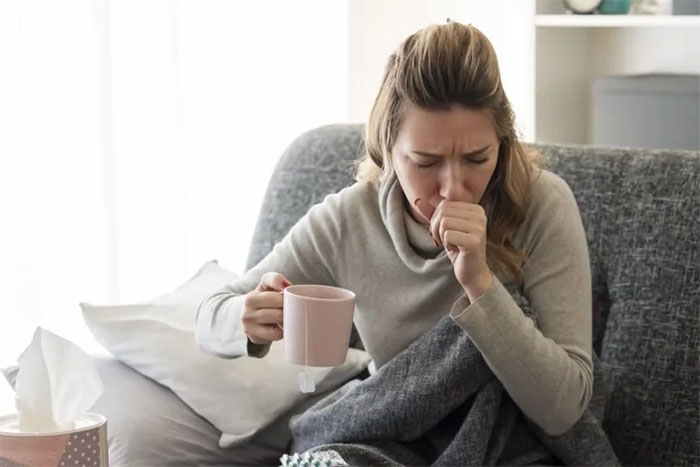Supplementing with vitamins D and C, along with a healthy lifestyle and regular exercise, can help improve your immunity and reduce the risk of illness.
Every year, we face terrible symptoms that can take days or even weeks to recover from. According to the Mayo Clinic, healthy adults can catch a cold 2-3 times a year, while infants and young children tend to catch colds more frequently.
The majority of people recover from the common cold within 7-10 days. Eat This Not That states that while there is no guaranteed way to prevent illness, there are many measures to reduce the risk of getting sick.

A healthy lifestyle can help you prevent illness during seasonal transitions. (Image: Eat This Not That).
Vitamin D Supplementation
Dr. Tomi Mitchell, a family physician in the United States, explains: “Vitamin D is essential for many functions in the body, including bone health, muscle function, and immune response. Some studies suggest that vitamin D may also help protect against various infections, such as respiratory infections and influenza.”
Some evidence indicates that vitamin D can help regulate immune cell activity and reduce inflammation. Furthermore, a deficiency in vitamin D is linked to an increased risk of respiratory infections. Therefore, it is important to supplement with vitamin D to boost your immunity and reduce the risk of illness.

Daily vitamin supplementation is a way to enhance your body’s resistance. (Image: Haberton).
Hand Washing
Washing your hands is one of the simplest and most effective ways to protect yourself and others from illness. When done correctly, it can eliminate harmful bacteria and viruses, preventing their spread.
Eat This Not That suggests some simple steps to ensure your hands are clean. First, you should wash your hands with soap and water for at least 20 seconds. This will help remove dirt and bacteria.
Next, scrub all surfaces of your hands, including the palms, backs of the hands, fingers, and nails. Finally, rinse your hands with clean water. Following these simple steps can significantly reduce your risk of getting sick.

Washing your hands is the simplest action you should take to avoid bacterial infections. (Image: The Jakarta Post).
Avoid Contact with Sick Individuals
While it is difficult to completely avoid contact with sick individuals, you can take some steps to reduce your risk of illness. For example, wash your hands frequently, avoid touching your face, and disinfect high-touch surfaces such as doorknobs and countertops.
If you must be near someone who is sick, wear a mask and always try to maintain a distance of 2 meters. Taking these simple precautions can help protect you from getting sick.

Always wear a mask in environments with sick individuals to prevent illness. (Image: Eat This Not That).
Do Not Smoke
Tobacco smoke contains thousands of harmful chemicals. These chemicals are absorbed into the bloodstream through the lungs, circulating throughout the body and damaging most organs.
Smoking weakens the immune system’s function. It is also a serious health hazard, and anyone who smokes is at risk of various diseases.
Exercise
Many studies have shown that maintaining physical activity can reduce the risk of illness. Exercise improves circulation, allowing the body to transport white blood cells and other infection-fighting cells more effectively throughout the body.
Additionally, physical activity helps reduce stress levels, which can weaken the immune system. You should aim to build a habit of walking or cycling for 30 minutes each day to maintain a healthy lifestyle and reduce your risk of illness.

To achieve a good physique and health, you should establish a daily exercise routine. (Image: HelpGuide).
Limit or Avoid Alcohol Consumption
Alcohol has various effects on the human body, both short-term and long-term. In the short term, alcohol can cause slurred speech, impaired judgment, and slowed reflexes. In the long term, excessive alcohol consumption can lead to liver disease, heart disease, and various types of cancer.
Limiting or avoiding alcohol is one of the best ways to protect your health. When you consume alcohol, your body has to work harder to process it, gradually weakening the immune system. As a result, you become more susceptible to illnesses like colds and flu. Therefore, if you want to maintain your health, it is best to limit or avoid alcohol altogether.

Alcoholic beverages can cause many serious health issues. (Image: CNN).
Food Supplements
Simple ingredients like lemon, ginger tea, and honey can help reduce your risk of illness.
Lemons are rich in vitamin C, which boosts the immune system. Ginger has anti-inflammatory properties that help soothe a sore throat. Green tea contains antioxidants that protect cells from damage. Additionally, honey has antibacterial properties that help combat infections.


















































